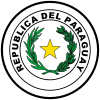Related Research Articles

Jehovah's Witnesses is a nontrinitarian millenarian restorationist Christian denomination.
Numerous cases involving Jehovah's Witnesses have been heard by Supreme Courts throughout the world. The cases revolve around three main subjects: practice of their religion, displays of patriotism and military service, and blood transfusions.
Jehovah's Witnesses have been criticized by adherents of mainstream Christianity, members of the medical community, former Jehovah's Witnesses, and commentators with regard to their beliefs and practices. The Jehovah's Witness movement's leaders have been accused of practicing doctrinal inconsistencies and making doctrinal reversals, making failed predictions, mistranslating the Bible, harshly treating former Jehovah's Witnesses, and leading the Jehovah's Witness movement in an autocratic and coercive manner. Jehovah's Witnesses have also been criticized because they reject blood transfusions, even in life-threatening medical situations, and for failing to report cases of sexual abuse to the authorities. Many of the claims are denied by Jehovah's Witnesses and some have also been disputed by courts and religious scholars.
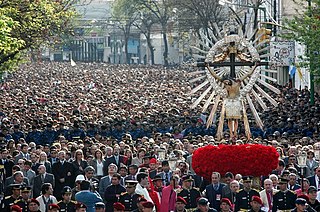
Christianity is the most widely professed religion in Argentina, with Roman Catholicism being its largest denomination. This historical background is very much due to the Spanish influence brought about through the newly conquered territories. However, affiliation with Protestant churches is increasing and immigration throughout the 20th century has brought other religions from various regions to Argentina.

Christianity is the predominant religion in Mexico, with Catholicism being its largest denomination representing around 78% of the total population as of 2020. In recent decades the share of Catholics has been declining, due to the growth of other Christian denominations – especially various Protestant churches, Jehovah's Witness and Mormonism – which now constitute larger shares of the population. Conversion to non-Catholic denominations has been considerably lower than in Central America, and central Mexico remains one of the most Catholic areas in the world.

Christianity in Russia is the most widely professed religion in the country. The largest tradition is the Russian Orthodox Church. According to official sources, there are 170 eparchies of the Russian Orthodox Church, 145 of which are grouped in metropolitanates. There are from 500,000 to one million Old Believers, who represent an older form of Russian Orthodox Christianity, and who separated from the Orthodox Church in the 17th century as a protest against Patriarch Nikon's church reforms.
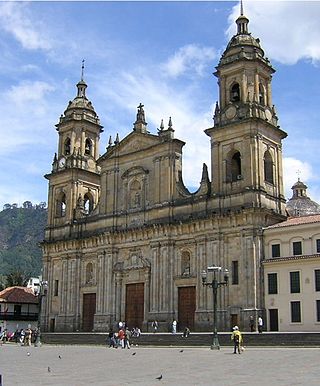
Religion in Colombia is dominated by various branches of Christianity and is an expression of the different influences in the Colombian culture including the Spanish, the Native Amerindian and the Afro-Colombian, among others.

Christianity is the largest religion in Uruguay, with Catholics having the most adherents, but around 44.5% of the population is non-religious as of 2021. Church and state are officially separated since 1916.

Christianity is the dominant religion in El Salvador. The Catholic share of the population is on decline while Protestantism is experiencing rapid growth in recent decades. The Spanish Conquistador Pedro de Alvarado named part of the territory of modern day El Salvador after Jesus Christ - San Salvador. The territory's name, including the province of San Miguel, was later extended to the Provincia De Nuestro Señor Jesus Cristo, El Salvador Del Mundo, shortened to the Republic of El Salvador, or Salvador, during the post-Federal Republic period and subsequently settled on as El Salvador.
The issue of Freedom of religion in Russia is complex with a long and fraught history. As of 2023, Russia is a majority Russian Orthodox society, with significant minority religions within its borders protected by the Constitution of Russia. However, the international community often disputes whether this protection is carried out in practice.
The Constitution provides for freedom of religion.
The Bulgarian constitution states that freedom of conscience and choice of religion are inviolable and prohibits religious discrimination; however, the constitution designates Eastern Orthodox Christianity as the "traditional" religion of the country.
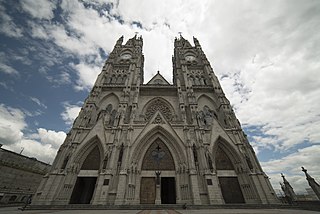
When it comes to religion, the Ecuadorian society is relatively homogeneous, with Christianity being the primary religion. Catholicism is the main Christian denomination in the country. There are also minorities of other religions.

Christianity is the predominant religion in Paraguay, with Catholicism being its largest denomination. Before the arrival of Spanish missionaries, the people residing in the territory of modern day Paraguay practiced a variety of religions.

Christianity is the largest religion in Benin, with substantial populations of Muslims and adherents of traditional faiths. According to the most recent 2020 estimate, the population of Benin is 52.2% Christian, 24.6% Muslim, 17.9 Animist and 5.3% follows other faiths or has no religion.

Christianity is the predominant religion in Solomon Islands, with Anglicanism being the single largest denomination.

Christianity is the largest religion in Nauru, with Nauru Congregational Church being the largest denomination, encompassing 35.71% of the population as of the 2011 census.
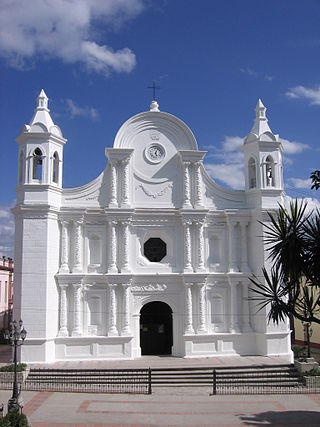
The predominant religion in Honduras is Christianity, with Catholicism and Evangelicalism being its main denominations. The country is secular and the freedom of religion is enshrined in the nation's constitution.
Freedom of religion in Ecuador is guaranteed by the country's constitution.

Religion in Togo is diverse, with Christianity being the most widely professed faith. A substantial number of the Togolese also practice traditional faiths and Islam.
References
- 1 2 3 4 5 6 7 8 US State Dept 2022 report
- ↑ Freedom House, retrieved 2023-08-08
- ↑ Religion affiliation in Paraguay as of 2018. Based on Latinobarómetro. Survey period: June 15 to August 2, 2018, 1,200 respondents.
- 1 2 3 "Paraguay". International Religious Freedom Report 2008. Bureau of Democracy, Human Rights, and Labor (September 19, 2008).
 This article incorporates text from this source, which is in the public domain .
This article incorporates text from this source, which is in the public domain .
